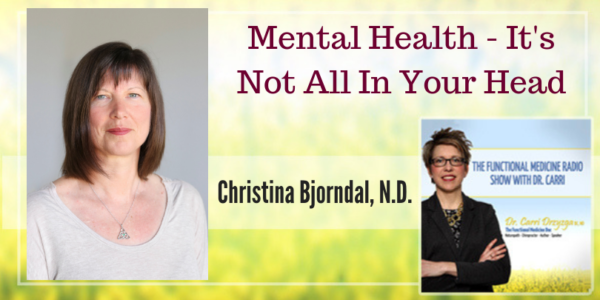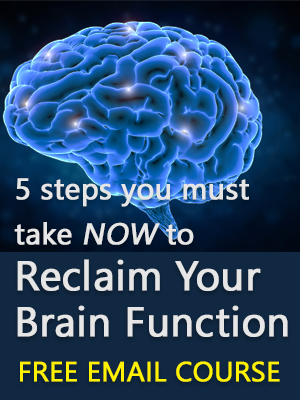Podcast: Play in new window | Download
Subscribe: Apple Podcasts | Android | RSS
In this episode of The Functional Medicine Radio Show, Dr. Carri’s special guest Dr. Christina Bjorndal talks about mental health.
Dr. Christina Bjorndal, ND is an authority in the treatment of mental illnesses such as depression, anxiety, bipolar disorders and eating disorders. Having overcome many mental health challenges, Dr. Chris is a gifted speaker and writer who has helped many patients achieve physical, mental, emotional and spiritual wellbeing. She has completed three books on mental health as well as a 10-week course and in-person retreat on mental health.
Main Questions Asked Mental Health:
- Can you talk about your story of regaining your mental health?
- What are some of the underlying factors that you look for when a patient comes in struggling with some kind of mental health issue?
- What can you tell us about the hormonal system?
- How do you look at neurotransmitters?
- Now what about detoxification?
- How do you address the mental, emotional and spiritual aspects of health?
Key Points made by Dr. Chris about Mental Health
- My story started with an eating disorder in high school (just as a side note, I was taking antibiotics the year prior). At the time there was no mention of the relationship between the gut microbiome and mental health.
- I was an overachiever which served me well until my third year of university when I found myself paralyzed by anxiety and debilitated by depression. I was treated with some success with antidepressants but a few months later I suffered a full-blown delusional psychotic manic episode. I was given a diagnosis of bipolar disorder.
- I basically pushed the diagnosis into a corner, ignored the whole thing, and went back to being the overachiever who had it all together. But I didn’t, this all culminated in a suicide attempt that left me in a coma with kidney failure.
- While on dialysis I was given a book to read by Marianne Williamson called A Return to Love. In it there’s a quote about surrender, which impacted me greatly because what I realized is that I didn’t love and accept myself, so I began to look for other ways and to find answers to what was going on with me.
- I went to a public forum and listened to a lecture by Dr. Abram Hoffer. I became his patient and started on a nutritional protocol, and shortly thereafter I began to feel relief from depression and anxiety which I hadn’t in the 15 prior years. I made a career change to naturopathic medicine to help others.
- First, I explain that there are four aspects to people: physical, mental, emotional and spiritual; and that western medicine is focused on the physical.
- I also explain that there are three macro-systems comprising the physical: neurotransmitters, the neuro-endocrine system, and organs of detoxification.
- With respect to the hormonal system, we need to understand that every hormone, when out of balance, can have symptoms like mental health conditions such as anxiety, depression, insomnia, mood swings, etc.
- Most times, people are adjusting the neurotransmitters, but I find that in most cases we have to look at the three macro-systems to find the root cause.
- When we talk about hormones, we’re talking about sex hormones, stress hormones, thyroid, insulin, al.; which are often overlooked, especially in mental health. This was the case for me.
- In addition to the patient’s symptoms, I will assess them using an objective questionnaire to give me a sense of the degree to which they are experiencing symptoms of, for example, depression.
- From the perspective of neurotransmitters, diet is a big piece. For example, serotonin, one of the main transmitters implicated in mental health, is derived in the body from tryptophan, which is an essential amino acid meaning we can’t make it ourselves.
- There are certain nutrients that are essential building blocks for these neurotransmitters. If you’re not getting them through your diet, there’s no ability for you to make them on your own.
- I think from a root cause perspective we always have to ensure that we’re eating the right foods, although supplementation is often required.
- I don’t prescribe tryptophan because serotonin production is not its primary object; in fact, if we’re under stress, then tryptophan goes to make quinolinic acid which can be considered a neurotoxin. Thus, managing stress is another big part of the mental health puzzle.
- The environmental piece, and the connection with the organs of detoxification is extremely important.
- People mostly think of mental health conditions resulting from a deficiency. Something to consider is that perhaps there’s something from the environment that is blocking a receptor so that the hormone or neurotransmitter cannot get into the cell to do its job.
- We talk about the gut, or our digestive system, as our second brain; its health is a very important piece of the puzzle. The relationship, or balance, of bacteria in your gut is really important in our overall health and helps our organs of detoxification.
- It helps to have regular bowel movements. If not, what can happen is that the liver works diligently to get toxins out of your body, which can now be eliminated through the bowel or the urine; if the stool sits in the large colon and there’s an imbalance in bacteria, there are bacteria that end up breaking up the chemicals that the liver worked to get rid of, and these end up being reabsorbed giving you another toxic hit.
- This in turn contributes to inflammation and to leaky gut syndrome.
- All these factors play a role, and it relates back to our prior use of medications, to our levels of stress, to the level of stomach acid that we have. We always want to look at what’s happening from a digestive perspective as well as the liver and the colon.
- So, for me, it started with the physical piece, but I still had to work on my thoughts and emotions. I teach people how to manage their mind so they’re not at the mercy of it. It’s important to understand that there is something called psychoneuroimmunology which means, basically, that your thoughts create neuropeptides, which then affect the hormones being produced in the body, which in turn can affect how you feel.
- It’s been a really important piece of my healing to learn how to manage my thoughts.
- I teach a Four R Process. The first R is to recognize the nature of the conversation going on in your head. The second step to refrain from following these thoughts any further. You refrain by relaxing into the present moment with your breath. The last R is to resolve to repeat this process.
- Learning to move ourselves from a sympathetic, or stressed, state into a parasympathetic, or relaxed, state is extremely important. So many functions in the body require you to be in a parasympathetic state to benefit fully, digestion is one of them. You could be eating the most pristine, organic food but if you’re in a sympathetic state you may not be getting the full benefit of the nutrition.
- Another important thing I want people to know is that ultimately learning to love and accept yourself is a really important part of this puzzle.
Resources Mentioned for Mental Health
Book – Beyond the Label: 10 Steps to Improve Your Mental Health with Naturopathic Medicine
Book – The Essential Diet: Eating for Mental Health
Dr. Carri’s interview with Kelly Brogan : Heal Your Body (Heal Your Mind)
Book – Reclaim Your Energy and Feel Normal Again
Thank you for listening! If you enjoyed this podcast, please subscribe and leave a 5 star rating and review on iTunes!




